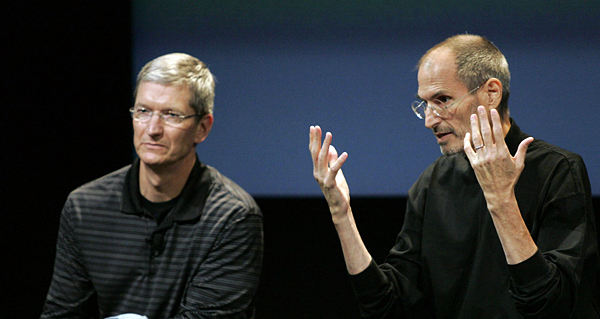Will Tim Cook be the next Steve Jobs?

Last month, after a press event at Apple's Cupertino headquarters, I made an off-the-cuff observation about the future leadership of the company. In short, I commented on how Chief Operating Officer Tim Cook, who took a portion of stage time from Jobs to talk about new notebooks, was wearing blue jeans and a black shirt - Jobs' signature outfit. Granted, a wardrobe does not make anyone worthy of a CEO title. But, given concerns this year about Jobs' health, it suddenly felt like Cook - who filled in as CEO for two months in 2004 while Jobs recovered from pancreatic cancer surgery - could be the successor when and if Jobs no longer carries the big title.
Now, Fortune magazine has published a pretty lengthy piece, called "The genius behind Steve," which looks at Cook - as well as a couple of other execs - who could be positioned to take the reins. (Techmeme) It's a good read that offers a deeper look into Cook as an executive and a human being. Consider these excerpts from Fortune:
Jobs has seen to it that Cook is getting public exposure, especially on Wall Street. He is a fixture on Apple's quarterly earnings calls, and he speaks at select investment conferences. "Operationally, when you think about what they've done - a massive retail-stores ramp, an expanded sales-channel presence, delivering new products without glitches, and managing huge seasonality - all speak to a company that is exceedingly well run," says (Toni) Sacconaghi, the Sanford Bernstein analyst, referring almost wholly to aspects of the company that Cook oversees.
Though he's capable of mirth, Cook's default facial expression is a frown, and his humor is of the dry variety. In meetings he's known for long, uncomfortable pauses, when all you hear is the sound of his tearing the wrapper of the energy bars he constantly eats... Cook's stamina is the stuff of legend at Apple. He often begins e-mailing the executives who work for him at 4:30 a.m.; worldwide conference calls can take place at any time of day. For years, Cook held a standing Sunday night staff meeting by telephone in order to prepare for yet more meetings on Monday morning.
Sure, Cook is a leader at Apple and his team has been behind some of the more successful business and product moves at the company. But does that make him a natural successor to Jobs (assuming he would even want the position)?
Outside Apple, many observers, informed and otherwise, assume Cook can't be Apple's next chief executive. "Nobody would make Tim Cook CEO," says a Silicon Valley investor who travels in the Apple orbit. "That's laughable. They don't need a guy who merely" gets stuff done. "They need a brilliant product guy, and Tim is not that guy. He is an ops guy - at a company where ops is outsourced." Michel Mayer, who was CEO of Freescale Semiconductor when it supplied Apple with microprocessors, has a slightly more positive take. "I'm not sure he'd be able to replace Steve's design creativity," Mayer says. "Then again, I could argue that it's not the role of the next CEO to do that."
Why is the successor to Steve Jobs such a big deal? Clearly, Jobs has become the face of Apple. And when he appeared at a conference earlier this year looking less than healthy, Wall Street wanted to know if he was OK. Then, Bloomberg accidentally posted his obituary. And, finally, when a citizen journalist falsely reported on a CNN site that Steve Jobs had suffered a heart attack, shares of the company immediately started nose-diving.
Apple declined comment for the Fortune piece. Still, it goes to show that Apple is one of those companies that generates a lot of interest. And those with an interest clearly want to know more about the contingency plan if Steve Jobs suddenly can no longer run the company.